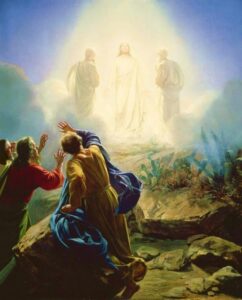Sunday before Lent St Andrew’s Milngavie
As we gathered today our prayers and thoughts were very much focused on the invasion and the people of Ukraine.
Next Sunday we warmly welcome the family and friends of Claire as we celebrate the Baptism of Sarah during the Sung Eucharist
Notices for this week:
Tuesday 10am Prayer Group in the Garden Room.
Thursday 10am Sung Holy Communion for Ash Wednesday followed by coffee in Friendship House
Readings for next Sunday – 1st Sunday of Lent Deuteronomy 26:1-11 Romans 10:8-13 Luke 4:1-13
Further news from the diocese and church can be found on the St Andrews website. Click on the link below.
https://standrewsmilngavie.church.scot/
Sunday before Lent St Andrew’s Milngavie
 Exodus 34:29-35
Exodus 34:29-35
2 Corinthians 3:12:-4:2
Luke 9:28-36:
This week the world has watched in horror and fear at the Russian invasion of Ukraine. For many weeks now Putin had kept us guessing about his invasion plans. But that all came to an end on Thursday morning when he finally removed his veil of intention in the most violent and menacing way. Now we can see quite clearly what his intentions really are.
Traditionally, in days gone by, in the marriage service a bride would remove her veil before the couple made their vows. This Symbolically expressed the belief that now the couple will begin to see each other as they really are
In the epistle today St Paul believed that when anyone turned to face the Lord, “the veil is removed”.
When Moses spoke to the Lord on Mount Sinai he too removes his veil, his face shining forms his conversation with our Lord.
In the gospel in the story of the transfiguration Jesus symbolically removes his veil and his face is transfigured. In the most extraordinary dramatic way, he reveals his identity, his divinity to the three of the disciples. The story comes at a vital turning point in the gospel. Jesus has ended his relatively popular ministry in Galilee and is about to start a journey to Jerusalem and death. Peter has declared that he believes that Jesus is the Messiah and Jesus has begun to explain to his disciples, much to their horror, that Messiahship means not glory and fame but death and betrayal.
It is at this crucial point in Jesus’ ministry that he and three of his disciples go up a mountain to pray. While he is praying, Luke says, his appearance is altered, and his clothes become a dazzling white. An extraordinary sight! No wonder the disciples don’t seem to know if they are awake or asleep and they keep quiet about it afterwards. It’s almost too strange to believe. Its purpose though is to clarify Jesus’ identity and to cement his credentials for the task ahead.
The presence of Moses and Elijah on the mountain – Moses as the greatest lawgiver in the history of the people of God. And Elijah – the greatest of the prophets – shows that Jesus is much more than a Galilean carpenter with a way with words and a healing touch. He is the fulfilment of all the Law and the prophets – The long-awaited Messiah. And as if to seal this point a strange cloud descends upon the assembled group. In the Bible clouds such as this mean one thing – the terrifying presence of God. It is meant to remind us of the giving of the commandments in the OT when just such a cloud descended on the mountain and the glory of the Lord was like “a consuming fire”.
Jesus represents a new Law, a new commandment, anointed by God himself for the task. But all too soon the drama is over, and the disciples leave the mountain. The transfigured Jesus, their vision of affirmation, is replaced by the veil of reality and uncertainty.
We also can have deep moments of spiritual engagement. Moments when we feel near to the Lord, confident in our faith – suffused with the spirit. But they too can be short lived, only to be preplaced by the veil of uncertainty, doubt and stumbling prayer. I suspect that is how many of us feel now.
As we look towards Lent, Holy week and Easter, the crucifixion and the resurrection we are about to be confronted with some of the most faith stretching parts of the Christian story. We will stand at the foot of the cross and in front of the empty tomb and reflect deeply on what they mean. Faith is seldom a question of lining up the facts and making a cold-hearted decision. Christianity asks us to believe the most unbelievable things.
But that is why we need imagination and trust. Not the kind of imagination which makes the untrue believable but that which make the unbelievable true. All we must do is remove our veil of uncertainty and face our Lord with hope, wonder and love.
A lot has happened in the last two years. As we face our post pandemic world, we may be fearful of what we see. The reality is we stare at possible new variants, war in Europe, energy crisis and goodness knows what else.
But if we can turn our face away from the news, away from our pain and angst, away from ourselves even and turn our face to God then we have no need for a mask, a veil of any sort for it is the face of God, mysterious at it is, that through the Holy spirit will transform and transfigure our souls and bring hope and salvation to our fractured world.
Amen
